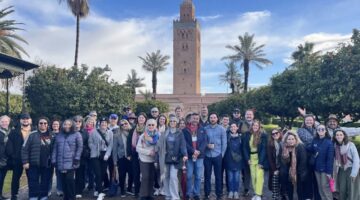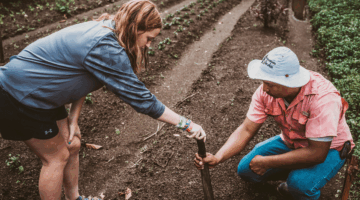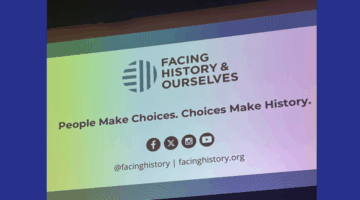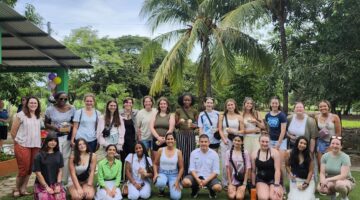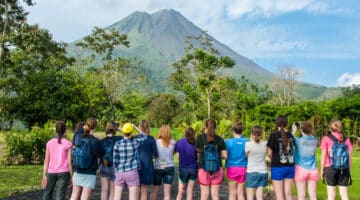6 Reasons Why Travel is the Best Education

It’s often said that “traveling is the best education.” I would thoroughly agree with this statement and if you’re reading this because you’ve organized trips with ACIS or simply been part of such a trip, I would hope that you also feel this way. Indeed, bold as it may sound, those of you who’ve traveled with ACIS and most definitely all of us who form part of their team, have good reason to believe in the company slogan, travel changes lives.
An ACIS trip is a fantastic way to make all those history, art-history, world-civilization and language lessons come to life. Once on a trip, students’ curiosity and imagination is often sparked by an encounter or discovery, be it Gothic architecture, Roman history, the European way of life or successfully communicating in the local language that may inspire their future studies and exploits.
Travel offers students learning experiences that come in all sorts of shapes and sizes and sometimes the less quantifiable lessons can be as equally transformational and incredibly valuable as those that lead to their life’s work. Traveling with a group of your friends as a young person can have a great impact on your personal development — changing a person’s world-view and giving them the tools necessary to thrive in adult life. Here are a few of the non-catalogue listed learning experiences that I’ve observed over the years and think are hugely beneficial to students.
1. Navigating the Metro System and Using Public Transportation with Confidence

Erika and Colleen from South Brunswick High School after successfully navigating the group around the Paris metro.
I can’t tell you the number of times I’ve taken students on their very first train or metro ride — something that in Europe is an essential way of life can seem like a terrifying prospect to many US teenagers. Mastering the Paris or London underground systems can be one of the most satisfying lessons for students and is hugely empowering.
Before each journey I ask the group to take out their metro or tube maps and together we plot the route, working out which line we need to take, which direction we will be traveling in and whether we have to make any changes. Even when I’ve worked with groups of street-wise New Yorkers, they can be nervous before their first journey and will want to avoid interchanges at the cost of walking an extra 20 minutes above ground (believe me, that’s saying something)! Just a day or two later however, I designate a pair of students to lead the rest of the group on each underground journey and they are ecstatic when they arrive successfully at their destination.
2. Relying on Your Own Two Feet
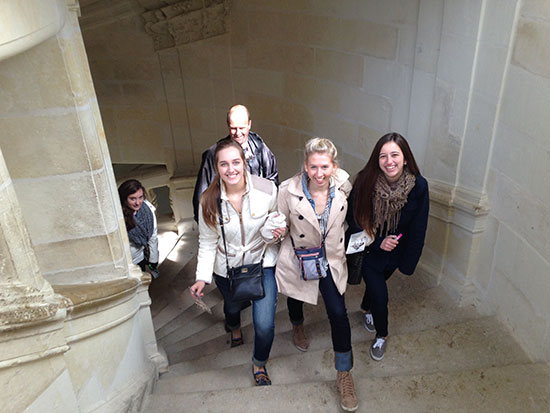
Students traveling on an ACIS trip to Europe will at some point experience a walk to a restaurant, through a town on a guided sightseeing tour, on a scavenger hunt or simply to get from A to B. The act of walking as a means of transport is something they are often quite unfamiliar with and at first, may protest against. In Europe however, the best and sometimes only way to get around is by foot. By the end of a trip not only has overly ambitious footwear been replaced by comfort (as well as style), but I often hear resolutions made to try to walk more back home. I love to hear this positive change of attitude and to witness students embrace something that they might have originally avoided.
3. Mastering Group Dynamics
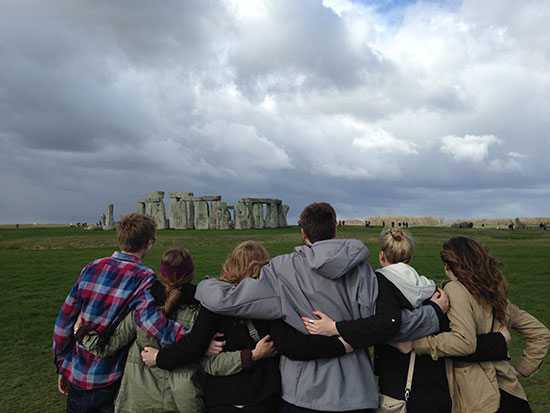
It’s not always easy spending almost 24/7 with a group of people, however much you consider them as friends. On arrival, friendship groups are often pre-established and students will just hope that the rooming will be so that they can stick with those who they know best. This is not always possible and it’s wonderful to see how, what at first was a reluctant room-share, may become a great and enduring friendship.
It would seem that by opening the mind to a new culture, the same attitude is applied to one’s own world. The curiosity and non-judgment cultivated through travel can lay the foundations for fantastic friendships. Spending so much time with a group of people through the good and the bad; those early morning wake-ups to catch trains, the late-nights on the Eiffel Tower and discovering a love of escargot, can bring people closer together.
On the other hand, it may be the case that no sparks of friendship fly and quite the opposite happens — that by the end of a week, those who were friends are no longer quite so amorous. Then the very fact of having to get along and endure one another, although it may not be fun, is an essential part of life and it’s a good lesson to learn!
It’s sometimes the case that several small school-groups travel together on the same trip, sharing the same Tour Manager, hotels and bus. In this case, the cultural differences between groups may also be great and once again, students may need to engage that open-minded attitude to get to know each other and to get along.
It’s wonderful to see that the adventurous spirit of travel can be time and again applied to getting to know your new travel companions and learning what makes people tick, what winds them up, and just generally how to get on whilst in close captivity 24/7. Not only does this teach students how to get on with others but crucially it requires them to get to know themselves a little better — an essential skill in life!
4. Understanding the Importance of Packing Light

It’s not uncommon to find that students travel with a suitcase that they could easily fit inside plus another cabin-approved wheelie suitcase, just because the airline permits it. Unless the trip is to last several months or years, this is always a dreadful mistake.
By the time I’m preparing the group for a successful boarding of a high-speed train; explaining that said train will stop for a maximum of three minutes in the station where we will board, after which point the doors will close automatically and 40+ students and their luggage must be on board — then the excessive packing suddenly seems flawed.
I’ve observed this realisation and regret with many students I’ve traveled with when a rail journey is part of the trip. I hope that an ACIS trip will encourage students to continue to travel independently in Europe when they’re at college and later in life, and so this shift in attitude is a valuable lesson to learn early!
Indeed, the benefits of having a different pair of shoes to match each outfit, quickly becomes slim in comparison to those of traveling light — an essential mantra for the experienced traveler. Not only do European trains become a breeze, but with some careful colour coordinated packing instead of twenty different outfits for nine days, you can save a lot of time on packing and unpacking between cities.
5. Becoming a “Security-Savvy” Traveler

As soon as groups arrive into big European cities, Tour Managers will rigorously warn students to be careful of their personal belongings and to beware of pickpockets. I always emphasize that on arrival day, whilst dealing with jet lag and not yet being acclimatized, being alert to this is especially important. Students can sometimes seem somewhat fearful to this warning – perhaps because the penny drops that they’re no longer in their familiar comfort zone and that they are being granted a taste of independence and responsibility.
A few days into a trip, it’s wonderful to witness the transformation of fearful students into security-savvy travelers. They quickly learn the importance of keeping passports in hotel safes or tucked safely into shirts with a money pouch or belt, not traveling with their life savings in cash on their person and to always keep a hold of purses whilst sitting in restaurants and at café terraces. Essential lessons for a stress-free life of travel!
6. Awakening the Culinary Traveler
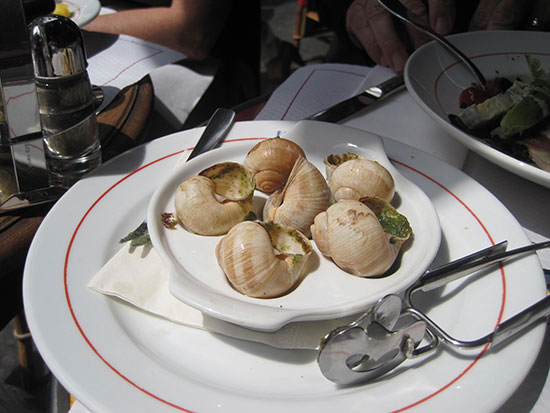
The difference between student’s willingness to try new food on arrival day compared to at the end of a trip is immense. Of course, dealing with jet lag and the already huge cultural shock they may experience, being presented with a plate of escargot on day one is less than ideal! For this very reason ACIS always aims to gently ease the groups into the culinary adventure that is travel and the first dinner will always aim to be based around ingredients that students will be familiar and comfortable with — unless of course you’ve otherwise requested. If you’re traveling with adventurous eaters, always make sure to tell your International Tour Consultant during your planning process so they can request meals and restaurants that work well with your group’s preferences.
Despite this, the most inoffensive and familiar dishes may be rejected at the start of a trip. I always encourage students to apply their experimental and adventurous traveler spirit to the local cuisine — it is always one of the best ways to discover a different culture and people. By introducing different dishes and food traditions in the places they visit, their curiosity is often awoken. Even more so if they take part in a cooking lesson and learn how to make paella in Spain, tiramisu in Italy or macarons in France, they can’t wait to sample the fruits of their labour.
Whatever the method, what’s certain is that by the end of a trip, there’s a huge change in attitudes to trying new food and with it, an attitude of curiosity and openness to new and exciting life experiences.
 Maggie McNulty is an ACIS Tour Manager from the United Kingdom. She caught the travel bug at a very early age and takes every opportunity to feed her passion for foreign lands.
Maggie McNulty is an ACIS Tour Manager from the United Kingdom. She caught the travel bug at a very early age and takes every opportunity to feed her passion for foreign lands.
Interested in exploring even more ways travel changes lives? Download our eBook and discover the unique ways travel has shaped the lives and careers of nearly 800 former ACIS student travelers.


